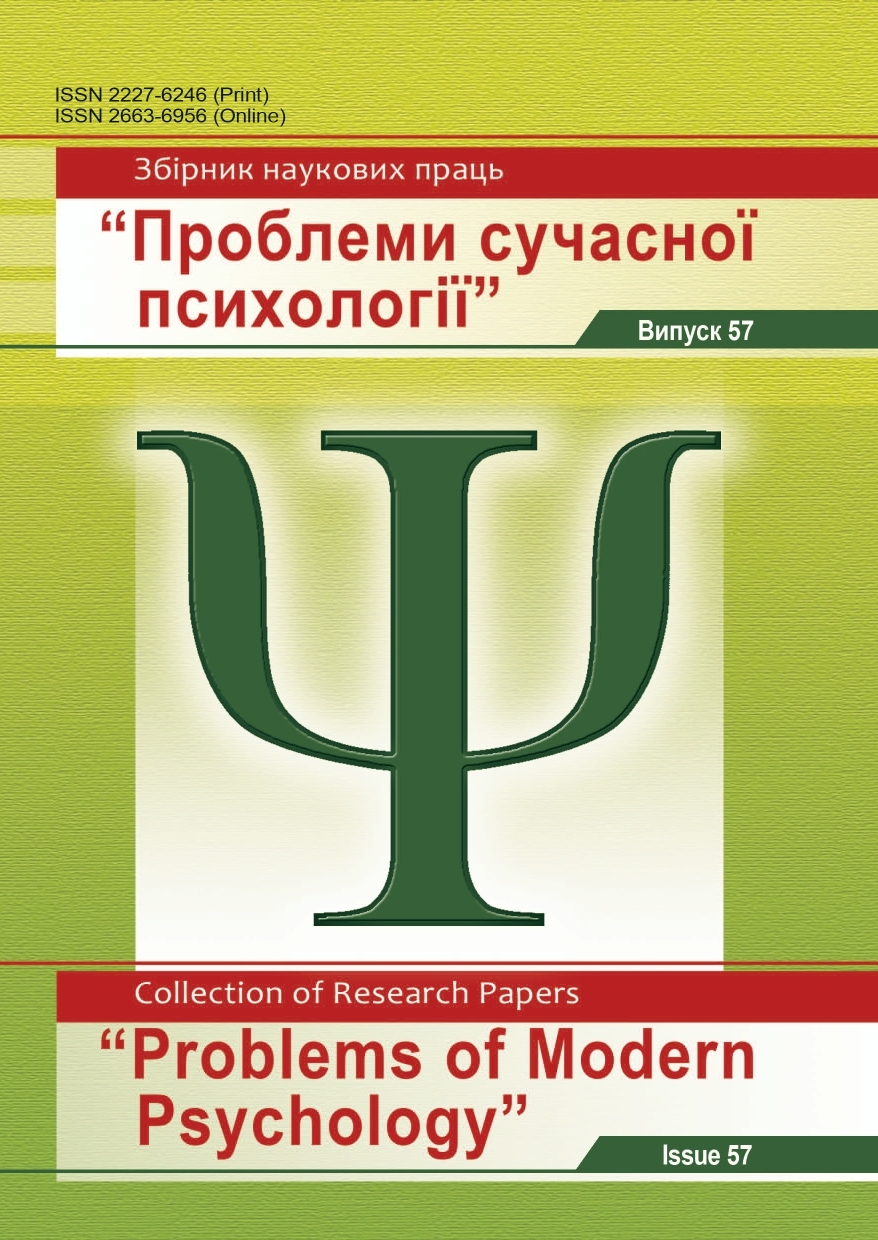The Characteristics of Inner Speech of a Personality by Use of the Method of Dialogical Analysis of the Case
DOI:
https://doi.org/10.32626/2227-6246.2022-57.32-50Keywords:
the method of dialogical analysis of the case, inner speech, external speech, egocentric speech, external monologues, a dialogue, social speechAbstract
The purpose of our article is to characterize the method of dialogical analysis of the case for description of inner speech of the person, to show it use on practice during the providing of statement experiment.
Methods of the research. The following theoretical methods of the research were used to solve the tasks formulated in the article: the categorical method, structural and functional methods, the methods of the analysis, systematization, modeling, generalization. Also in our research we used a statement experiment as an empirical method. With the aim to diagnose the level of the development of inner speech of the person we used the author’s method of dialogical analysis of the case.
The results of the research. In the article it was shown, that human feelings act as an experience of “Me”, and in this regard it is as external monologues, and on the other hand they are dialogical in nature, they can hear a broken dialogue with others: appeals, questions, expected answers, desires that are not expressed, accusations, etc., that exists in a covert form of internal dialogue. Under the dialogical analysis of the case we understand the reconstruction of the movement of internal dialogue, which becomes possible as a result of a special attitude to the text (for this purpose, special methods of textual analysis were developed).
Conclusions. The inner speech was showed to be the speech for himself/ herself. External speech is speech for others. Psychologically, the language of the pupil in functional and structural terms is egocentric speech, it is not understood as internal speech and is not separated by the child from speech for others. Objectively, this language is a function differentiated from social thinking, but again inconsistent, because it can only function in a situation that makes social speech possible.
References
Honcharuk, Nataliia, & Onufriieva, Liana (2018). Psykholohichnyi analiz rivniv pobudovy komunikatyvnykh dii [Psychological analysis of levels of communicative actions’ constructing]. Psycholinguistics. Psykholinhvistyka. Psikholyngvistika – Psycholinguistics. Psycholinguistics. Psycholinguistics, 24(1), 97–117. Retrieved from https://doi.org/10.31470/2309-1797-2018-24-1-97-117 [in Ukrainian].
Mykhalchuk, Nataliia, & Ivashkevych, Eduard (2022). Empirychnyi instrumentarii vprovadzhennia metodu dialohichnoho analizu vypadku u psykhodiahnostychnu ta psykhoterapevtychnu praktyku [Empirical tools for implementing the method of dialogical case analysis in psychodiagnostic and psychotherapeutic practice]. Rivne: Rivne State University of the Humanities [in Ukrainian].
Mykhalchuk, Nataliia, & Ivashkevych, Eduard (2018). Psycholinguistic features of the development of social intelligence of the teacher. Psycholinguistics. Psykholinhvistyka. Psikholingvistika – Psycholinguistics. Psycholinguistics. Psycholinguistics, 23 (1), 242–257. DOI: https://doi.org/10.5281/zenodo.1211618.
Mykhalchuk, Nataliia, & Kryshevych, Olha (2019). The peculiarities of the perception and understanding of Sonnets written by W. Shakespeare by the students of the Faculty of Foreign Languages. Psycholinguistics. Psykholinhvistyka. Psikholingvistika – Psycholinguistics. Psycholinguistics. Psycholinguistics, 26(1), 265–285. DOI: 10.31470/2309-1797-2019-26-1-265-285.
Onufriieva, L., & Ivashkevych, Ed. (2021a). Contemporary approaches to the problem of the development of cognitive activity of pupils according to the ways of managing the young learner’s classroom. Zbirnyk naukovykh prats «Problemy suchasnoi psykholohii» – Collection of research papers “Problems of modern psychology”, 52, 61–83. Retrieved from https://doi.org/10.32626/2227-6246.2021-52.61-83.
Onufriieva, L., & Ivashkevych, Ed. (2021b). The development of learner’s autonomy by the way of the formation of social intelligence. Zbirnyk naukovykh prats «Problemy suchasnoi psykholohii» – Collection of research papers “Problems of modern psychology”, 51, 9–32. Retrieved from https://doi.org/10.32626/2227-6246.2021-51.9-32.
Downloads
Published
How to Cite
Issue
Section
License
Copyright (c) 2022 Ivashkevych Eduard, Simko Ruslan

This work is licensed under a Creative Commons Attribution-NonCommercial 4.0 International License.
Copyright
The Editorial Board has the full right to publish original scientific papers containing results of theoretical and experimental research works which are not currently subject to review for publication in other scientific editions. The Author shall transfer to the editorial board of the Collection the right to spread the electronic version of the paper, as well as the electronic version of the paper translated into English (for papers originally submitted in Ukrainian and Russian) by all kinds of electronic means (placement at the official website of the Collection, electronic databases, repositories etc).
The Author of an article reserves the right to use materials of the paper, without approval with the editorial board and the founders of this Collection: a) partially or fully, for educational purposes; b) for writing own dissertation papers; c) for preparation of abstracts, conference reports and presentations.
The Author of an article can place electronic copies of the paper (including the final electronic version downloaded from the official website of the Collection) at:
- personal web resources of all Authors (websites, webpages, blogs etc.);
- web resources of the institutions where the Authors are employed (including electronic institutional repositories);
- non-profit public access web resources (for example, arXiv.org).
But in all cases, it is obligatory to have a bibliographic reference to the paper, or a hyperlink to its electronic copy placed at the official website of this Collection.






